The BBC’s Sally Nabil has been given rare access to Awamiya in Saudi Arabia, a town in the east of the Sunni Muslim-ruled kingdom that has been rocked in recent months by deadly clashes between security forces and Shia militants that were triggered by the demolition of its old quarter.
“You will have only a few minutes on the ground. When we say ‘go’, you will have to leave at once,” a Saudi police officer told us firmly as we got on an armoured vehicle heading to Awamiya.
As we approached the town, escorted by special forces, officers kept talking to their commanders over the phone to make sure the convoy was safe to proceed.
The security situation in Awamiya remains unstable, although the government says it is in control.
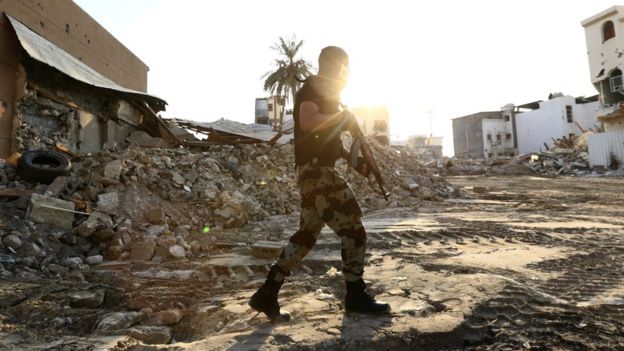 Image copyrightREUTERS/FAISAL AL NASSER
Image copyrightREUTERS/FAISAL AL NASSERWhen we got to Awamiya, the scale of devastation was shocking. It looked like a war zone – as if we were in Mosul or Aleppo.
The town, which lies in the Qatif region of oil-rich Eastern Province, was home to about 30,000 people, most of them Shia.
Now, there is nothing left of the once vibrant residential area but bullet-riddled houses, and burned-out cars and shops – a testament to the heavy fighting.
Members of Saudi Arabia’s Shia minority have for years complained about what they perceive as discrimination and marginalisation at the hands of the Sunni monarchy.
But their protests have always been met by a crackdown.
“The Saudi regime does not accept opposition, whether it comes from a Sunni or a Shia. They are just intolerant,” Ali Adubisi, the director of the Berlin-based European-Saudi Organisation for Human Rights, told me.
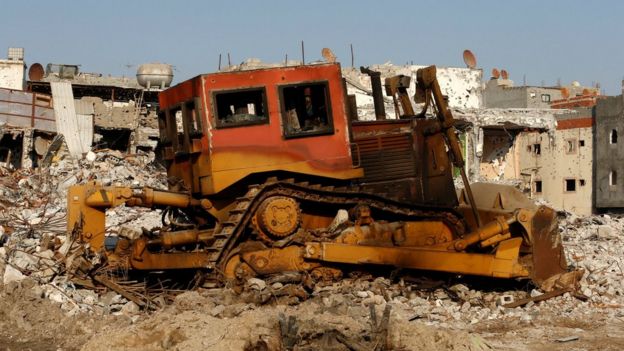 Image copyrightREUTERS/FAISAL AL NASSER
Image copyrightREUTERS/FAISAL AL NASSERAs I walked around Awamiya, I saw a few bulldozers standing in the middle of the wasteland.
In May, the authorities started demolishing the 400-year-old al-Musawara area, as a part of what it says is a “development project”.
“Eighty houses were demolished, and we still have about 400 more to go. These are dilapidated buildings, they should be modernised,” acting mayor Essam Abdullatif Al-Mulla told me.
“Families have been relocated after being generously compensated and offered alternative houses.”
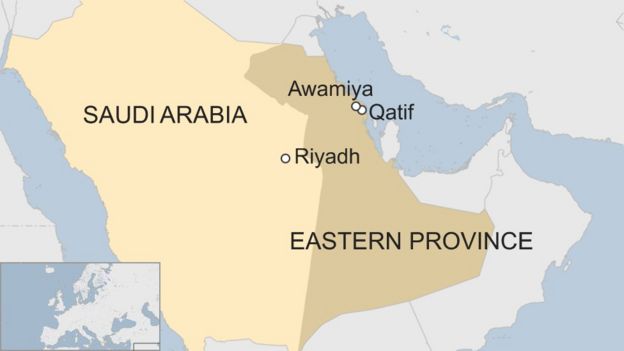
As soon as the demolitions started, the confrontation in Awamiya took a violent turn.
Shia groups accused police troops of forcing people to leave, with the aim of crushing dissent.
Activists say security forces sealed off the town’s entrances and exits in late July, denying remaining residents access to essential services such as medical care.
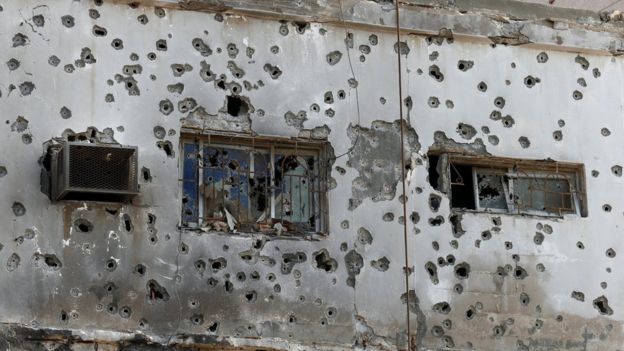 Image copyrightREUTERS/FAISAL AL NASSER
Image copyrightREUTERS/FAISAL AL NASSERThe violence has killed more than 20 civilians, among them a three-year-old boy who died on Wednesday, in addition to at least five militants, according to activists.
The Saudi authorities say eight police officers and four special forces personnel have died, but did not release any information on civilian and militant deaths.
The interior ministry has blamed the unrest on “terrorist groups who have been in the area for years”.
A statement said government forces had been attacked repeatedly with rocket-propelled grenades, Molotov cocktails and machine guns.
“Terrorists indiscriminately killed civilians, and used them as human shields. People fled because they felt threatened by the militants,” it added.
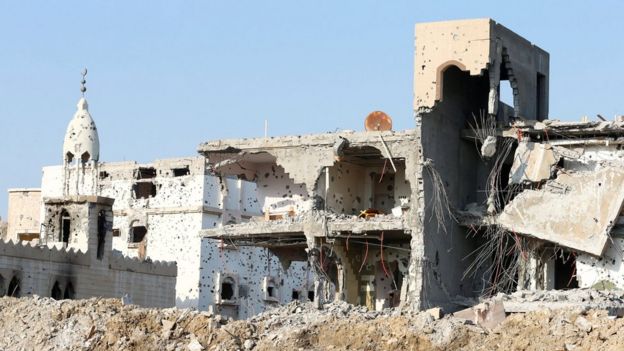 Image copyrightREUTERS/FAISAL AL NASSER
Image copyrightREUTERS/FAISAL AL NASSERBut there is another version to this story.
I managed to find a Saudi man who recently fled Awamiya, and is now seeking asylum in Germany.
“Security forces would shoot everyone – a man, a woman, an elderly person, or even a child,” he said.
“For days I couldn’t step out of my house. I was too scared.”
The man, who asked us not to identify him as he feared for his life, told me he had never personally taken up arms but that he understood why some people had chosen to do so.
“You can be sentenced to death in Saudi Arabia just because you are a Shia and you belong to a different religious sect.”
“The people are deprived of their freedom and dignity and might even be executed in unfair trials. They won’t remain silent forever. If someone shoots you, you will have to shoot back.”
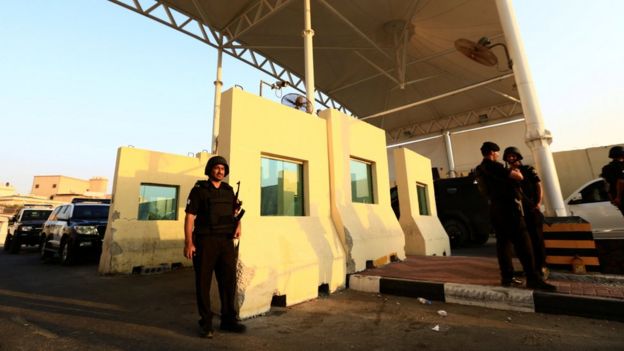 Image copyrightREUTERS/FAISAL AL NASSER
Image copyrightREUTERS/FAISAL AL NASSERThe man recalled the start of the Shia protests in Awamiya in early 2011, when people emboldened by the Arab Spring uprisings across the region took to the streets.
“We were peaceful protesters, but security forces used to disperse us with live ammunition,” he said.
Since then, hundreds of people have been arrested. Human rights groups say Specialised Criminal Courts, set up for terrorism cases, have sentenced more than three dozen men and boys to death after convicting them of protest-related crimes following unfair trials.
Activists fear that 14 protesters, including four found guilty of offenses committed when they were children, could be executed at any moment.
They include the nephew of Sheikh Nimr Baqir al-Nimr, a prominent Shia cleric and vocal critic of the government who was convicted of terrorism offensives and executed in January 2016.
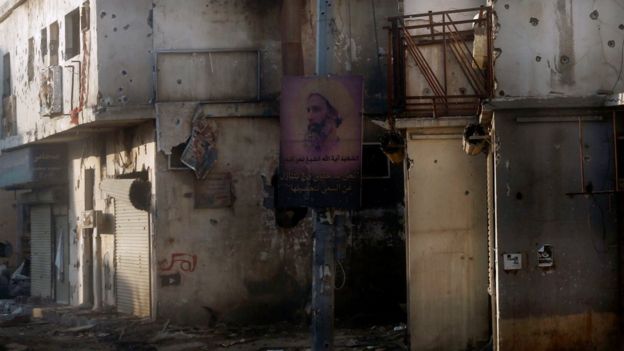 Image copyrightREUTERS/FAISAL AL NASSER
Image copyrightREUTERS/FAISAL AL NASSEROur brief visit to Awamiya was interrupted by gunshots, fired from a distance.
We did not know whether it was the police, or the armed groups. But we had to leave at once, just as the commander said.
On our way back, I looked through the car window, and wondered if life would return to this ghost town any time soon.
It is very difficult to tell, as the reasons for the unrest are still very much present.


